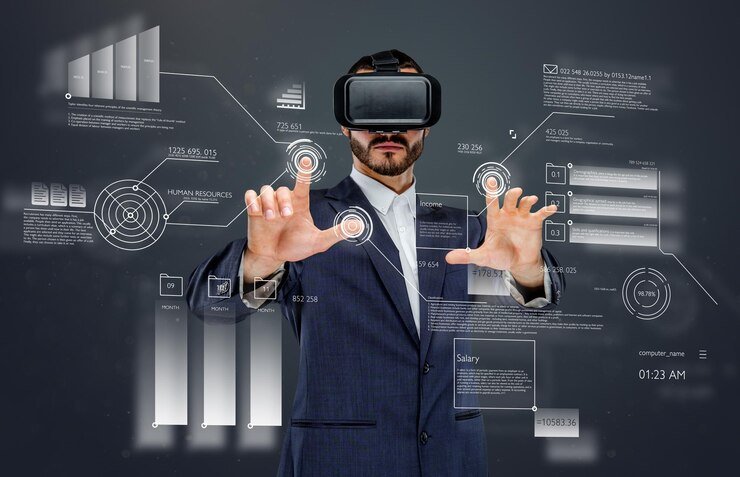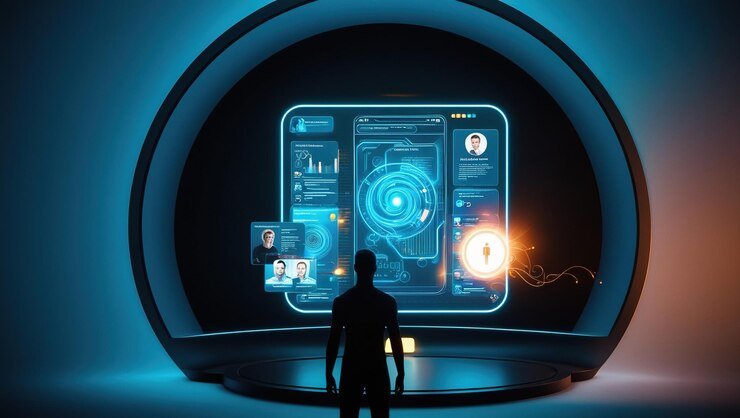The Future of Technology Innovation: Trends to Watch
September 14, 2024 | by New IP

Introduction to Technology Innovation
Technology innovation is reshaping our world at an unprecedented pace. New advancements are not just transforming industries; they’re redefining how we live, work, and interact with one another. From the rise of artificial intelligence to the interconnectedness brought by the Internet of Things (IoT), every aspect of our lives is being touched by these groundbreaking developments.
As we stand on the cusp of a technological revolution, it’s essential to keep an eye on emerging trends that promise to shape our future. With each new breakthrough comes excitement and uncertainty—will it enhance our lives or pose new challenges? Join us as we explore what’s next in technology innovation and uncover key trends that are set to change everything we know about progress.
Artificial Intelligence and Machine Learning
Artificial Intelligence (AI) and Machine Learning (ML) are at the forefront of technology innovation. These technologies are reshaping industries by enabling systems to learn from data, adapt, and make decisions with minimal human intervention.
AI is not just about robots or chatbots. It encompasses a range of applications—from predictive analytics in healthcare to personalized recommendations on streaming platforms. The ability for machines to analyze vast amounts of information quickly opens doors we never imagined possible.
Machine learning thrives on data. By using algorithms that improve over time, it can identify patterns unseen by the human eye. This capability enhances everything from fraud detection in finance to optimizing supply chains in retail.
As these tools evolve, they become more sophisticated and accessible. Businesses that harness their power stand to gain a significant competitive edge in an increasingly digital world.
Virtual and Augmented Reality
Virtual and Augmented Reality (VR and AR) are transforming how we interact with the digital world. These technologies create immersive experiences that blur the lines between reality and imagination.
In education, VR can transport students to ancient civilizations or distant planets, enhancing learning through experience. Meanwhile, AR overlays digital information onto our real-world environment, making tasks like assembly or repairs simpler and more intuitive.
Gaming is another area where VR shines, delivering unparalleled engagement. Players find themselves inside rich narratives rather than just observing them from a distance.
Beyond entertainment, industries such as healthcare utilize VR for training medical professionals in realistic simulations. This hands-on approach increases preparedness without putting patients at risk.
As these technologies evolve, their applications will only expand further into daily life—from virtual meetings to remote collaboration—offering new ways to connect and share ideas globally.
Internet of Things (IoT)
The Internet of Things (IoT) is reshaping how we interact with the world around us. Imagine a home where your refrigerator alerts you when you’re low on groceries, or your thermostat learns your preferences and adjusts automatically.
This technology connects everyday objects to the internet, enabling seamless communication between devices. As more gadgets become “smart,” our lives are becoming increasingly convenient and efficient.
Industries are also leveraging IoT for real-time data collection. From agriculture monitoring soil conditions to smart cities optimizing traffic flow, the possibilities are vast.
However, while this connectivity offers tremendous benefits, it raises concerns about security and privacy. With so many devices exchanging data, safeguarding personal information becomes crucial.
As IoT evolves, it will continue to influence various sectors profoundly, paving the way for smarter solutions in homes and industries alike. The future looks bright for interconnected living.
Blockchain Technology
Blockchain technology has emerged as a game-changer across numerous sectors. Its decentralized nature offers increased security and transparency, making it ideal for various applications.
At its core, blockchain allows data to be stored across multiple nodes. This means that the information is not controlled by a single entity, which reduces risks of manipulation or fraud.
Beyond cryptocurrencies, industries like finance, supply chain management, and healthcare are beginning to harness its capabilities. For instance, in supply chains, tracking products from origin to consumer enhances accountability and trust.
Smart contracts are another exciting aspect of blockchain. They automatically execute transactions when conditions are met. This innovation streamlines processes while minimizing human error.
As organizations explore new ways to integrate this technology into their operations, the potential seems limitless. The future will likely see even more creative uses emerge as businesses adapt and innovate further with blockchain solutions.
Biotechnology
Biotechnology stands at the intersection of biology and technology, unlocking incredible possibilities for various sectors. From agriculture to healthcare, its impact is profound.
In medicine, biotechnological advancements have revolutionized drug development. Tailored therapies target specific diseases more effectively than ever before. Gene editing techniques like CRISPR are offering solutions that seemed impossible just years ago.
Agricultural biotechnology improves crop resilience against pests and changing climates. This innovation not only boosts food security but also minimizes environmental footprints.
Moreover, synthetic biology is enabling the creation of biofuels from waste materials. This shift could significantly reduce our reliance on fossil fuels while promoting sustainable practices.
As biotechnologists continue to push boundaries, ethical discussions surrounding these innovations become crucial. Society must navigate the implications carefully as we embrace this transformative field in technology innovation.
The Impact on Society
Technology innovation is reshaping society in profound ways. It influences how we communicate, learn, and work. With advancements like artificial intelligence and the Internet of Things, our daily experiences are becoming increasingly interconnected.
People are more informed than ever before. Access to information is instantaneous, breaking down barriers between knowledge and individuals. This democratization fosters creativity and empowers communities.
However, these changes come with challenges. The digital divide persists, leaving some behind as others surge ahead. Privacy concerns grow as technologies evolve faster than regulations can keep pace.
Social dynamics shift too; relationships often take place online rather than face-to-face. While this creates opportunities for new connections, it also raises questions about authenticity and emotional well-being.
As technology continues its rapid advancement, society must adapt alongside it—striking a balance that embraces innovation while addressing ethical implications for all individuals.
Predictions for the Future
As we look ahead, the pace of technology innovation will only accelerate. We can expect artificial intelligence to become increasingly integrated into everyday life. Smart assistants may evolve beyond simple tasks, anticipating our needs and preferences.
The Internet of Things is set to expand dramatically. Imagine homes where every device communicates seamlessly with one another, creating a truly interconnected lifestyle.
Augmented reality could transform how we experience entertainment and education. Virtual classrooms might offer immersive learning environments that break geographical barriers.
Blockchain’s potential extends far beyond cryptocurrencies. Its use in securing digital identity and enhancing supply chain transparency will reshape trust in transactions.
Biotechnology advancements promise breakthroughs that could revolutionize healthcare, leading to personalized medicine tailored to individual genetic profiles. The future holds immense possibilities as these innovations converge, shaping a new digital landscape for society at large.
Current Trends in Technology
Current trends in technology are shaping the future at an unprecedented pace. Artificial intelligence is making waves across industries, enhancing efficiency and personalizing experiences like never before.
The Internet of Things (IoT) continues to connect devices seamlessly. Smart homes and wearables are becoming standard, allowing users to control their environments from anywhere.
Augmented reality and virtual reality are expanding horizons too. These technologies offer immersive experiences that transform everything from gaming to training simulations.
Blockchain technology is gaining traction for its potential beyond cryptocurrencies. Its ability to provide transparency and security attracts various sectors looking for innovative solutions.
As these trends evolve, they create exciting opportunities for businesses and individuals alike. The interplay between them will likely influence how we interact with technology daily, pushing boundaries further than ever imagined.
A. Artificial Intelligence
Artificial intelligence is transforming the landscape of technology innovation. It’s not just about robotics or automation anymore. AI now permeates various sectors, enhancing efficiency and decision-making.
Machine learning algorithms analyze data at lightning speed, uncovering patterns that humans might miss. This capability allows businesses to predict consumer behavior more accurately and tailor their services accordingly.
Natural language processing also plays a vital role in improving customer interactions. Chatbots handle inquiries round-the-clock, providing a seamless experience for users without needing human intervention.
Moreover, AI’s influence extends into healthcare with predictive analytics helping doctors make better diagnoses faster. From finance to education, artificial intelligence continues to drive significant advancements across industries.
As we look ahead, the integration of AI will only deepen. The possibilities are vast and exhilarating as innovators explore new frontiers in this dynamic field. Each development brings us closer to smarter solutions for everyday challenges.
B. Internet of Things (IoT)
The Internet of Things (IoT) is reshaping how we interact with our environment. Everyday objects are becoming smarter, connecting seamlessly to the internet. From smart home devices to wearable tech, IoT enhances convenience and efficiency.
Imagine your refrigerator sending you a message when you’re low on groceries. Or your thermostat adjusting automatically based on your schedule. These innovations streamline daily routines and optimize energy consumption.
Businesses also benefit from IoT by improving operations through real-time data analysis. Sensors in manufacturing can predict equipment failures before they happen, saving time and resources.
As more devices connect, security becomes paramount. Protecting sensitive information will be crucial as we rely heavily on these interconnected systems.
The potential for growth in this sector is immense, transforming industries like healthcare and agriculture into more responsive ecosystems ripe for innovation.
C. Augmented Reality/Virtual Reality
Augmented Reality (AR) and Virtual Reality (VR) are reshaping our digital landscape. These technologies blend the physical and virtual worlds, offering immersive experiences like never before.
Imagine walking through a museum where historical artifacts come to life. With AR, this is possible. Users can interact with 3D models while learning about their significance in real time.
On the other hand, VR transports users into entirely new environments. From exploring distant planets to diving deep underwater, the possibilities are endless. This technology enhances gaming but also finds applications in education and training.
Industries are beginning to harness these tools for practical purposes too—architects visualize projects before construction begins, while healthcare professionals practice surgeries in simulated settings.
As both AR and VR continue evolving, they promise to redefine how we engage with content daily. The future looks vibrant as innovation drives these technologies forward at an unprecedented pace.
D. Blockchain
Blockchain technology has transformed the landscape of digital transactions. It offers a decentralized ledger system that enhances transparency and security, making it increasingly appealing to various sectors.
Beyond cryptocurrencies, businesses are exploring blockchain for supply chain management. This innovation allows companies to track products in real-time, ensuring authenticity and reducing fraud.
Moreover, blockchain is paving the way for smart contracts. These self-executing agreements automatically enforce terms without intermediaries, streamlining processes across industries.
In healthcare, blockchain can secure patient data while allowing authorized access to necessary information. This could significantly improve privacy standards in sensitive environments.
As we look ahead, integrating blockchain with other technologies will become commonplace. Its potential to disrupt traditional systems makes it a key player in future technology innovations.
Future Predictions and Speculations
As we look ahead, the landscape of technology innovation promises to be both thrilling and unpredictable. Experts suggest that artificial intelligence will evolve beyond simple tasks. It might take on complex decision-making roles in various sectors.
Additionally, advancements in biotechnology could lead to groundbreaking medical treatments tailored specifically for individuals. Imagine personalized medicine based on genetic profiles becoming commonplace.
The Internet of Things is expected to become more integrated into daily life. Smart homes may soon anticipate our needs before we even express them.
Meanwhile, blockchain technology could disrupt traditional financial systems entirely, enhancing security and transparency across industries.
Amid these advances, ethical considerations will grow increasingly important. The dialogue surrounding responsible innovation is likely to intensify as society grapples with new capabilities and their implications for privacy and autonomy.
Impact on Different Industries
Technology innovation is reshaping industries at an unprecedented pace. Take healthcare, for example. Telemedicine and AI-driven diagnostics are transforming patient care, making it more accessible and efficient.
In agriculture, smart farming techniques utilize IoT devices to monitor soil conditions and crop health. This leads to higher yields with less resource waste.
The retail sector has also seen a significant shift. E-commerce platforms leverage augmented reality to enhance the shopping experience, allowing customers to visualize products in their space before purchasing.
Finance is becoming increasingly decentralized due to blockchain technology. Traditional banking methods are being challenged as cryptocurrencies gain traction.
Manufacturing isn’t left out either; automation and robotics streamline production lines while improving safety standards.
Each industry faces its unique challenges but thrives on innovation’s rapid evolution, continuously pushing boundaries for better solutions and efficiencies.
Ethical Concerns and Regulations
As technology innovation accelerates, ethical concerns loom larger. With advancements like AI and IoT, questions arise about privacy, surveillance, and data ownership.
The rapid pace of development often outstrips existing regulations. This creates a complex landscape where users may face risks without adequate protection. The challenge lies in balancing innovation with responsible use.
Regulatory bodies are beginning to take notice. They aim to craft frameworks that ensure safety while fostering creativity. However, regulations can stifle progress if applied too rigidly.
Transparency is becoming vital as businesses navigate these waters. Consumers demand clarity on how their data is used and protected.
Startups must also tread carefully. They drive much of the tech innovation but need to prioritize ethics in their business models or risk public backlash.
The conversation around ethics will shape the future trajectory of technology itself.
The Role of Startups in Driving Innovation
Startups are the lifeblood of technology innovation. They inject fresh ideas and perspectives into established industries, pushing boundaries that larger companies often overlook.
Agility is a defining trait of startups. Their small teams can pivot quickly, adapting to market demands with ease. This nimbleness allows them to experiment with cutting-edge technologies without the bureaucratic delays that plague bigger firms.
Many groundbreaking advancements in artificial intelligence, blockchain, and IoT have emerged from startup environments. These emerging companies aren’t just creating products; they’re reshaping entire sectors by challenging norms.
Collaboration also plays a key role. Startups frequently partner with research institutions and established corporations to expand their reach and enhance their offerings. Through these collaborations, they bring innovative solutions directly to consumers faster than traditional methods would allow.
Investment in startups continues to grow as venture capitalists recognize their potential for disrupting markets and driving forward-thinking solutions across various domains.
Conclusion
As we look ahead, it’s clear that technology innovation will continue to shape our world in profound ways. The trends we’ve explored—ranging from artificial intelligence to biotechnology—are not just fleeting fads; they represent the future of how we interact with each other and our environment.
The impact on society is already evident. From enhancing healthcare through biotech advancements to revolutionizing industries with blockchain, these technologies offer exciting possibilities and some challenges. It’s crucial for us to stay informed about ethical concerns and regulations that may arise as these innovations develop further.
Startups play a pivotal role in this landscape. They drive creativity and push established companies toward new horizons. As they innovate, we can expect significant shifts across various sectors like finance, education, entertainment, and beyond.
With current trends paving the way for an immensely connected world filled with opportunities, embracing technology innovation is essential for growth and progress. Our journey into this vibrant era has begun—and it’s one worth watching closely as it unfolds before our eyes.
RELATED POSTS
View all


